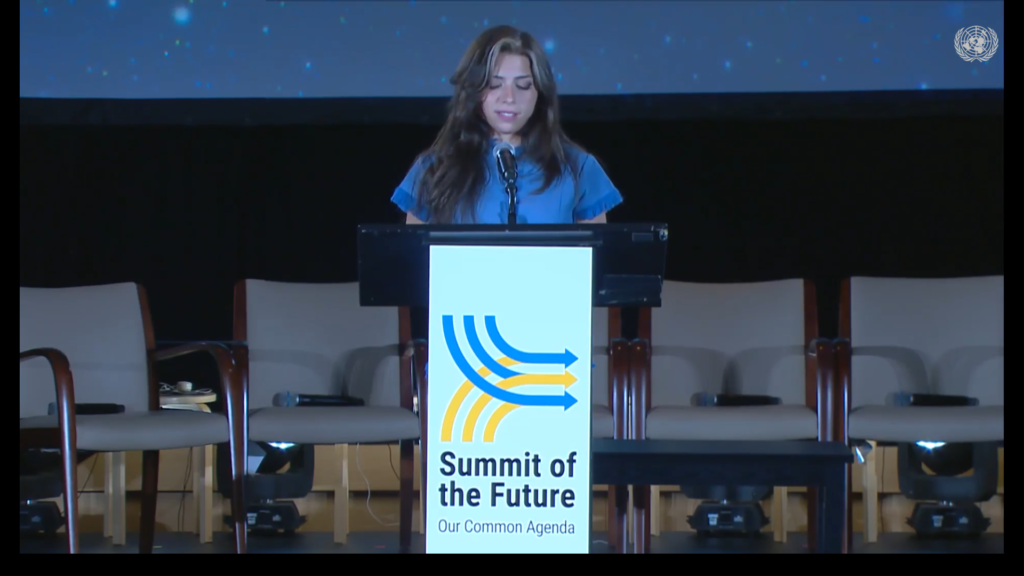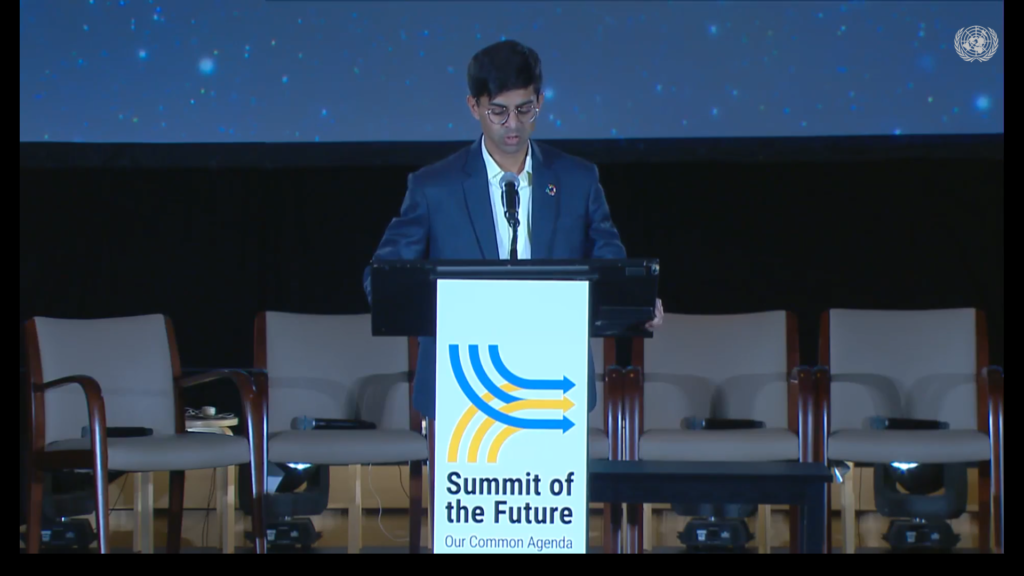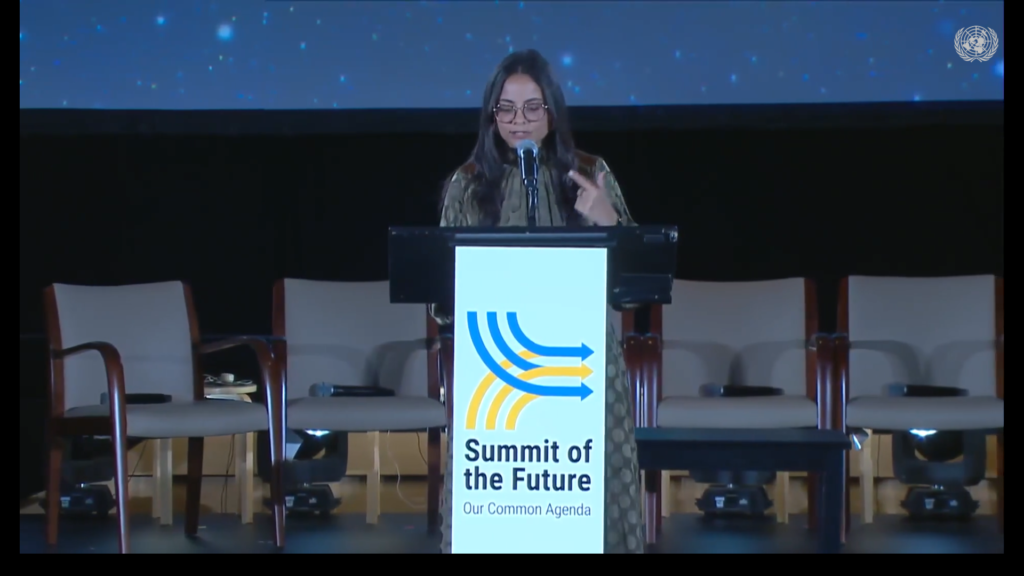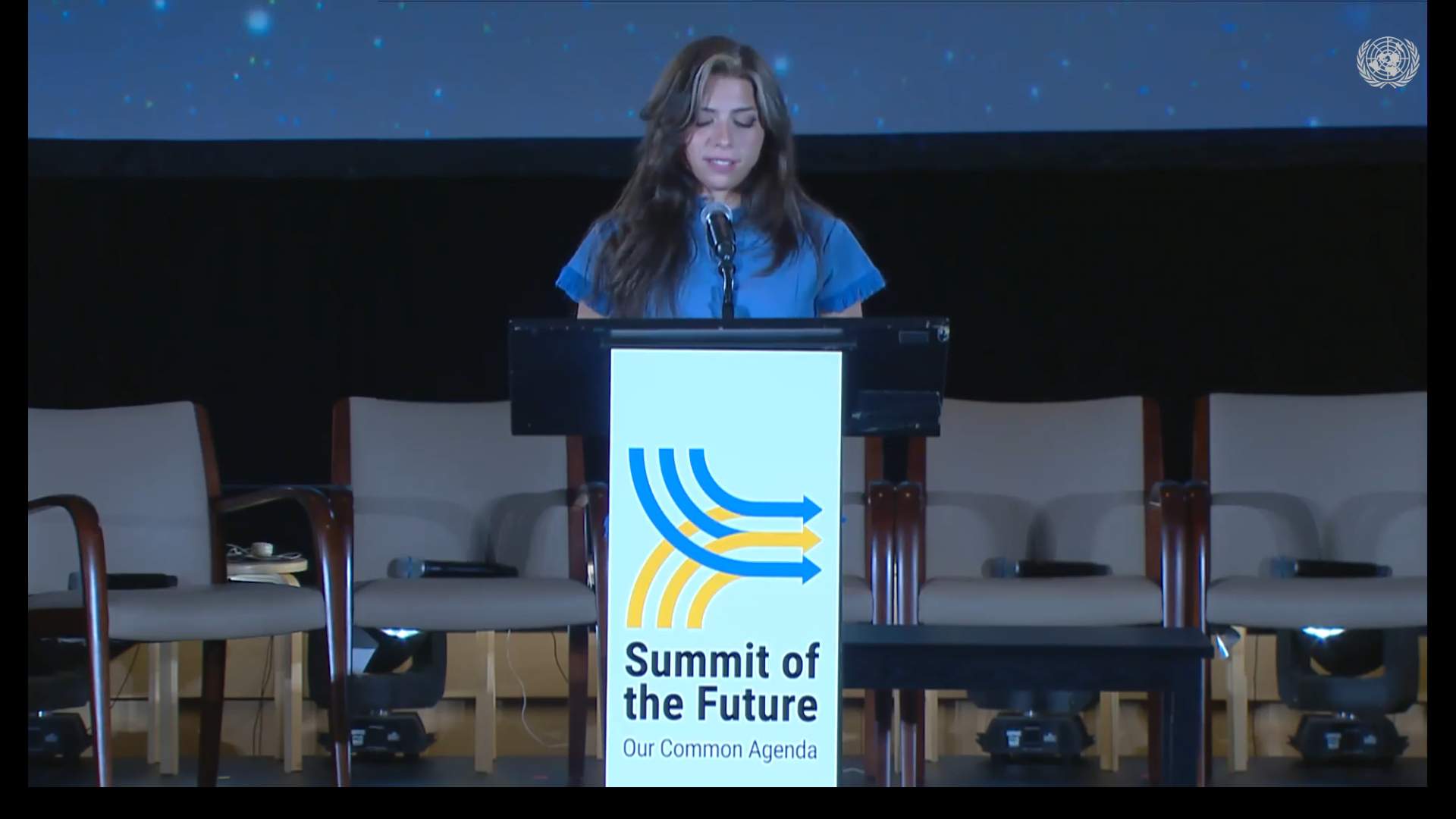By Baboloki Semele – Young people called for an inclusive digital future. The call was made last month at the Summit of the Future’s first Action Day. The first day opened with an inspiring youth-led session, “#YouthLead: Inclusive Digital Future for All,” focusing on the role of young people in shaping the future of digital technology and artificial intelligence (AI). This session, grounded in the Pact for the Future and the upcoming Global Digital Compact, aimed to highlight the importance of youth engagement in global digital governance and equitable access to digital tools. It underscored the urgency of addressing disparities in digital access, especially for marginalized communities, while highlighting the potential of digital tools for social change.
The session featured a diverse group of youth leaders, including Sara Sabry, Executive Director of Deep Space Initiative and first African female astronaut, Zubair Junjunia, founder of ZNotes and UNDP & Samsung Generation17 Young Leader. Kickstarting the debate, Sara offered a message grounded in her unique perspective from space. “Few experience a vantage point that transcends borders, cultures, and divisions, she said, describing the Earth as one interconnected and fragile system. “From space, you see no lines separating countries—just one Earth, our shared home. But here on the ground, I have witnessed firsthand the devastating impact of oppression, from gender inequality to the denial of basic human rights.”

Sabry spoke passionately about the need for action to protect both human rights and the environment, emphasizing that hope is an active choice. “The future is in our hands, and the challenges we face, no matter how overwhelming, are solvable,” she declared. Drawing from her background as an engineer, Sabry explained how complex problems can be broken down into manageable parts, stressing that solutions to climate change and inequality are within reach if approached step by step.

Adding to the debate, Zubair shared his personal journey, stating, “Years ago, I chose not to accept the status quo—the uneven playing field of education. Everyone has a right to access quality education. At the age of 16, I started ZNotes to share my study notes.” Today, ZNotes stands as the world’s largest peer-learning community, reaching over five and a half million students in 190 countries, thanks to thousands of young people who have joined this global movement.
Zubair outlined how their community-powered learning platform has proven to improve students’ self-efficacy, sense of global citizenship, and willingness to contribute to social development. He emphasized the importance of three key assets in the fight against educational inequality: the power of youth, the power of community, and the power of technology. “Young people are not just passive beneficiaries; we need to flip the script and empower them to be agents of change and creators of education,” He stated.
He also highlighted the critical role of peer learning: “Many of you will remember learning from each other after school or in coffee shops. Peer learning is proven to significantly enhance academic outcomes.” Zubair noted that emerging technologies like AI have the potential to personalize learning, empower educators, and enable inclusive assessments. “In our fight against educational inequality, it’s more important than ever to address the barrier of the digital divide. An inclusive digital world is integral to an inclusive global society,” he concluded.

Another highlight of the session came from Melissa Muñoz, Director of Innovation at the Government Office of Information and Communication Technologies of the Dominican Republic (OGTIC). Empowering Youth to Lead Educational Transformation
At the age of 25, Melissa spearheaded the Dominican Republic’s first national AI strategy, a key development in AI governance in Latin America. Reflecting on her journey, she shared, “When I was 25, I found myself in a room full of policymakers, developers, and designers, tasked with a monumental responsibility. It wasn’t just about technology—it was about the future of millions of Dominicans left behind in the digital age.”
Melissa emphasized how the digital divide isn’t just a technological problem but a social one. She discussed how AI can enhance education and drive economic growth, but also warned of the risk of biased data leading to exclusion. She further urged global leaders to prioritize AI inclusion, ensuring that technology development reflects diverse perspectives.
The session concluded with a call to action for global leaders convening at the Summit. Melissa emphasized that building an inclusive digital world is integral to fostering an inclusive global society. “Emerging technologies like AI offer unprecedented opportunities to personalize learning and enable inclusive educational assessments. But we must also tackle the barrier of the digital divide to ensure that every young person has the chance to learn and thrive,” she said.
The session spotlighted the six key objectives of the Global Digital Compact, which is expected to be finalized in the coming days. These objectives include accelerating progress toward the Sustainable Development Goals (SDGs), expanding inclusion in the digital economy, and promoting responsible and equitable governance of AI and data.
Speakers also celebrated the creative energy of youth who are already leveraging digital tools to effect positive social change. Malik Afegbua, a Nigerian filmmaker and creative technologist, shared examples of how young people are using their skills to drive innovation in their communities. “Digital technology gives us the tools to share our stories and create solutions to the challenges we face.”As the session came to a close, the resounding message was clear: youth are not waiting for permission to lead—they are already at the forefront, shaping a future that is more inclusive, equitable, and digitally connected for all.
